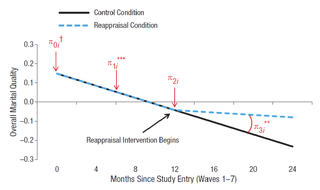Need to Talke a Step Back in the Relationship

Source: picjumbo.com/Pexels.com
Think back on the last big fight you had with your partner. Or if you have trouble thinking of the last one, think of one major blowout that still sticks in your memory. How much do you think that fight was your fault? How much was it your partner's fault? Who do you think engaged in more of the 4 worst negative behaviors during the fight?
Now, if I asked your partner those same questions, do you think I would get the same answers? Probably not. If you are like most people, you think your partner is more to blame for the conflict. And your partner, if they're like most people, thinks you are more to blame.
Why? It's always easier to see things from your own point of view (that is your default view, after all). But because you have access to all of your own thoughts and feelings and not your partner's, this creates an information asymmetry—you know all the reasons why you reacted the way you did, why you feel the way you do, why you said what you said. But you don't know those things about your partner (because were you listening, really listening, when they tried to explain them to you?)
You can reduce that asymmetry a bit by learning to take what is called a "self-distanced" or "third person" perspective. This type of perspective helps you be more objective in seeing your own and your partner's role in a conflict. It appears to have many benefits—people who are told to take a distanced perspective while recalling a negative experience report feeling fewer negative emotions, gain more insight about the experience, and have smaller increases in blood pressure compared to people who take the more typical, immersed perspective.
In one study, researcher Eli Finkel and his colleagues found that taking a distanced perspective protected against declines in marital quality over time. This is important because in most marriages, marital quality declines over time.
How did they do this? They followed 120 couples for two years, assessing their marital quality every four months. They also had the partners describe the most significant disagreement they had had with their spouse over the prior four months. They were instructed to just describe the facts of the disagreement.
In the second year of the study, half of the couples were assigned to an experimental condition where they were instructed to think about the disagreement they had just described from a distanced perspective. They were asked to imagine the disagreement from the perspective of a neutral third party who wants the best for all involved. They spent seven minutes writing about the conflict from that distanced perspective, as well as planning for how they could successfully take a distanced perspective in future disagreements.

Source: Finkel et al. (2013)
And that distanced perspective seemed to work wonders. Starting in the second year of the study (when half of the couples started taking a distanced perspective), the two groups diverge in their marital quality. The group with no distanced perspective continues on the same downward trajectory typical of marital quality, while the group who took a distanced perspective begins to show a plateauing or steadying off effect.
What is going on with these couples? Can a 7-minute intervention three times a year really change the course of a marriage? The researchers don't have the answer to this question, and this is only one study, but perhaps these couples got into the habit of taking each other's perspective and were able to do it effectively when they had a disagreement, leading to them feel more understood during conflict, which can negate the ill effects of conflict.
Want to try your hand at self-distancing? Think again about the last big fight you had with your partner. Recall as much as you can about this fight and try to bring it up in your imagination. Once you have recalled the fight, close your eyes. Go back to the time and place of the fight and try to see it in your imagination.
Now take a few steps back. Move away to a point where you can watch the fight unfold from a distance and see yourself in the fight. Imagine that you are a neutral third party observer who just wants the best for you both and who is focused on getting something good out of the disagreement. Replay the disagreement, watching as a distanced observer. As you watch it happen, look for times when you engaged in negative behaviors. How does your partner respond to them? Now, try to imagine what you could have said or done instead. How do you think your partner would have reacted then?
After you finish watching the conflict unfold from the more distanced perspective, take a few moments to think about any insights you gained from watching the conflict as an outside observer. How would an outside observer have seen the fight, how might they have been able to find the good that could come out of it? Think about what is difficult about taking a distanced perspective. What obstacles do you face? What can you do to be successful at taking a distanced perspective when you have disagreements with your partner?
Self-distancing can be hard, but it seems that the more you practice, the easier it gets. If you can take a distanced perspective during a conflict, great! But if that is difficult, it is worth doing this exercise even after a fight happens. Often we stew about prior fights, especially ones that don't end well. We let old fights take up unpleasant brain space until they get trotted out again the next time the issue arises. Instead of letting this happen, take a few minutes after you've calmed down but while it is still fresh in your mind to process the fight through a distanced perspective. It may help you gain insight and get some closure.
References
Finkel, E. J., Slotter, E. B., Luchies, L. B., Walton, G. M., & Gross, J. J. (2013). A brief intervention to promote conflict reappraisal preserves marital quality over time. Psychological Science, 24(8), 1595-1601.
Need to Talke a Step Back in the Relationship
Source: https://www.psychologytoday.com/us/blog/between-you-and-me/201703/taking-step-back-could-save-your-relationship
0 Response to "Need to Talke a Step Back in the Relationship"
Post a Comment